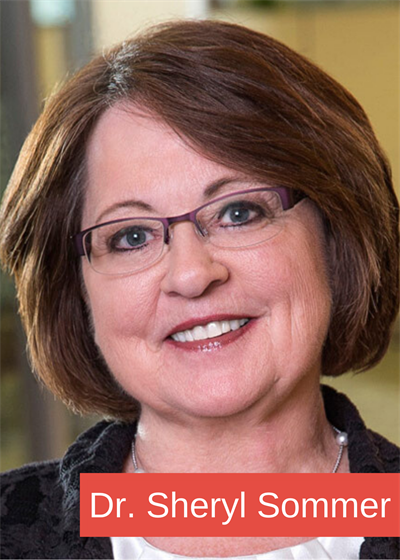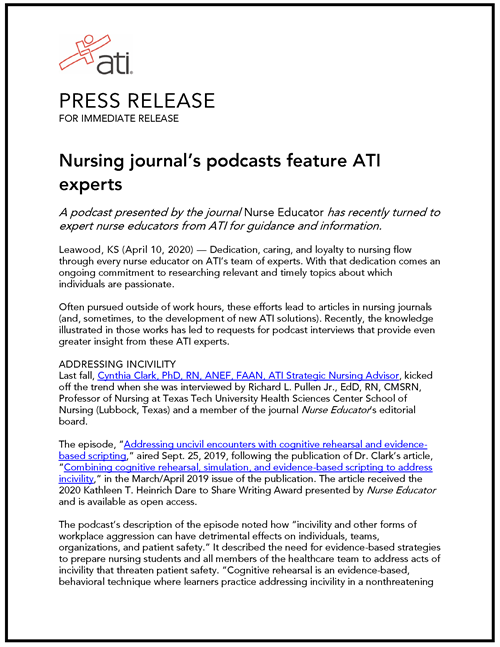
Nursing journal’s podcasts feature ATI experts
A podcast presented by the journal Nurse Educator has recently turned to expert nurse educators from ATI for guidance and information.
Leawood, KS (April 10, 2020) — Dedication, caring, and loyalty to nursing flow through every nurse educator on ATI’s team of experts. With that dedication comes an ongoing commitment to researching relevant and timely topics about which individuals are passionate.
Often pursued outside of work hours, these efforts lead to articles in nursing journals (and, sometimes, to the development of new ATI solutions). Recently, the knowledge illustrated in those works has led to requests for podcast interviews that provide even greater insight from these ATI experts.
ADDRESSING INCIVILITY
 Last fall, Cynthia Clark, PhD, RN, ANEF, FAAN, ATI Strategic Nursing Advisor, kicked off the trend when she was interviewed by Richard L. Pullen Jr., EdD, RN, CMSRN, Professor of Nursing at Texas Tech University Health Sciences Center School of Nursing (Lubbock, Texas) and a member of the journal Nurse Educator’s editorial board.
Last fall, Cynthia Clark, PhD, RN, ANEF, FAAN, ATI Strategic Nursing Advisor, kicked off the trend when she was interviewed by Richard L. Pullen Jr., EdD, RN, CMSRN, Professor of Nursing at Texas Tech University Health Sciences Center School of Nursing (Lubbock, Texas) and a member of the journal Nurse Educator’s editorial board. The episode, “Addressing uncivil encounters with cognitive rehearsal and evidence-based scripting,” aired Sept. 25, 2019, following the publication of Dr. Clark’s article, “Combining cognitive rehearsal, simulation, and evidence-based scripting to address incivility,” in the March/April 2019 issue of the publication. The article received the 2020 Kathleen T. Heinrich Dare to Share Writing Award presented by Nurse Educator and is available as open access.
The podcast’s description of the episode noted how “incivility and other forms of workplace aggression can have detrimental effects on individuals, teams, organizations, and patient safety.” It described the need for evidence-based strategies to prepare nursing students and all members of the healthcare team to address acts of incivility that threaten patient safety. “Cognitive rehearsal is an evidence-based, behavioral technique where learners practice addressing incivility in a nonthreatening environment with a skilled facilitator,” it went on. “In this thought-provoking podcast, Dr. Cynthia Clark describes cognitive rehearsal, evidence-based scripting, deliberate practice, and debriefing to address uncivil encounters that threaten co-worker and patient safety.”
Dr. Clark has written several articles for Nurse Educator. Other recent topics include “Fostering civility in learning conversations: Introducing the PAAIL communication strategy” and “An evidence-based approach to integrate civility, professionalism, and ethical practice into nursing curricula.”
REDUCING LANGUAGE BIAS
 Sheryl Sommer, PhD, MSN, RN, CNE, Vice President and Chief Nursing Officer of ATI, has also been published numerous times in Nurse Educator. Recent works include a February article, “Relationships between decision-making processes in developing clinical judgment skills” and an earlier piece, “Concept-based curricula: A national study of critical concepts,” coauthored with Jennifer Brussow, M.A.; Christine Mills, PhD; Karin Roberts, PhD, RN, CNE; and Matthew Scaruto, MA.
Sheryl Sommer, PhD, MSN, RN, CNE, Vice President and Chief Nursing Officer of ATI, has also been published numerous times in Nurse Educator. Recent works include a February article, “Relationships between decision-making processes in developing clinical judgment skills” and an earlier piece, “Concept-based curricula: A national study of critical concepts,” coauthored with Jennifer Brussow, M.A.; Christine Mills, PhD; Karin Roberts, PhD, RN, CNE; and Matthew Scaruto, MA.But it was an article in Teaching and Learning in Nursing, “Reducing language bias in nursing education: Equipping educators,” that served as the basis for being interviewed on a Nurse Educator podcast.
In the article, Dr. Sommer and her collaborators — Timothy Beitzel, MSN, RN; Pamela Osuri, MSN, RN, CNS; and Erin Rosfeld, MSN, RN — suggested that nurse educators could reduce the use of language bias in healthcare by increasing awareness and using inclusive language with students. It also suggested that nurse educators could create educational experiences that embrace diversity and inclusion to promote the delivery of culturally competent care.
The Dec. 18, 2019, Nurse Educator podcast interview, “What nurse educators need to know about language bias” — also led by Dr. Pullen — discussed how words and phrases could be offensive, hurtful, or confusing to a person or group of people. The conversation detailed strategies for nurse educators to use in eliminating language bias from casual and professional conversations and in the development of test questions for exams.
HANDLING CIVILITY & STRESS DURING THE COVID-19 PANDEMIC
The most recent Nurse Educator podcast featuring an ATI expert aired on April 6. Again hosted by Dr. Pullen, he interviewed Dr. Clark on an episode titled, “Civility Mentor: A virtual learning experience for nursing students.” The podcast’s description previewed it this way: “Embracing civility in the academic and practice environments is critical especially during this time of the COVID-19 pandemic. Having conversations about civility can help faculty and students cope with the stress they are experiencing. Civility Mentor is a virtual learning experience that faculty can use to promote civility among faculty and students and help prepare students to communicate, collaborate, and establish professional relationships in the practice environment when students graduate.”The podcast linked to Dr. Clark’s similarly titled, open-access article, “Civility Mentor: A virtual learning experience” published ahead of print last November in Nurse Educator. That article, coauthored with Michelle Dunham, PhD, described a study delving into the need for evidence-based teaching strategies to prepare nursing students to address incivility in academic and practice settings. The results of that study reinforced the effectiveness of ATI’s virtual-based solution, Civility Mentor.
To stay up to date with future podcasts featuring ATI experts, bookmark ATI’s News page.
# # # # #
 About ATI
About ATI
Leave a comment